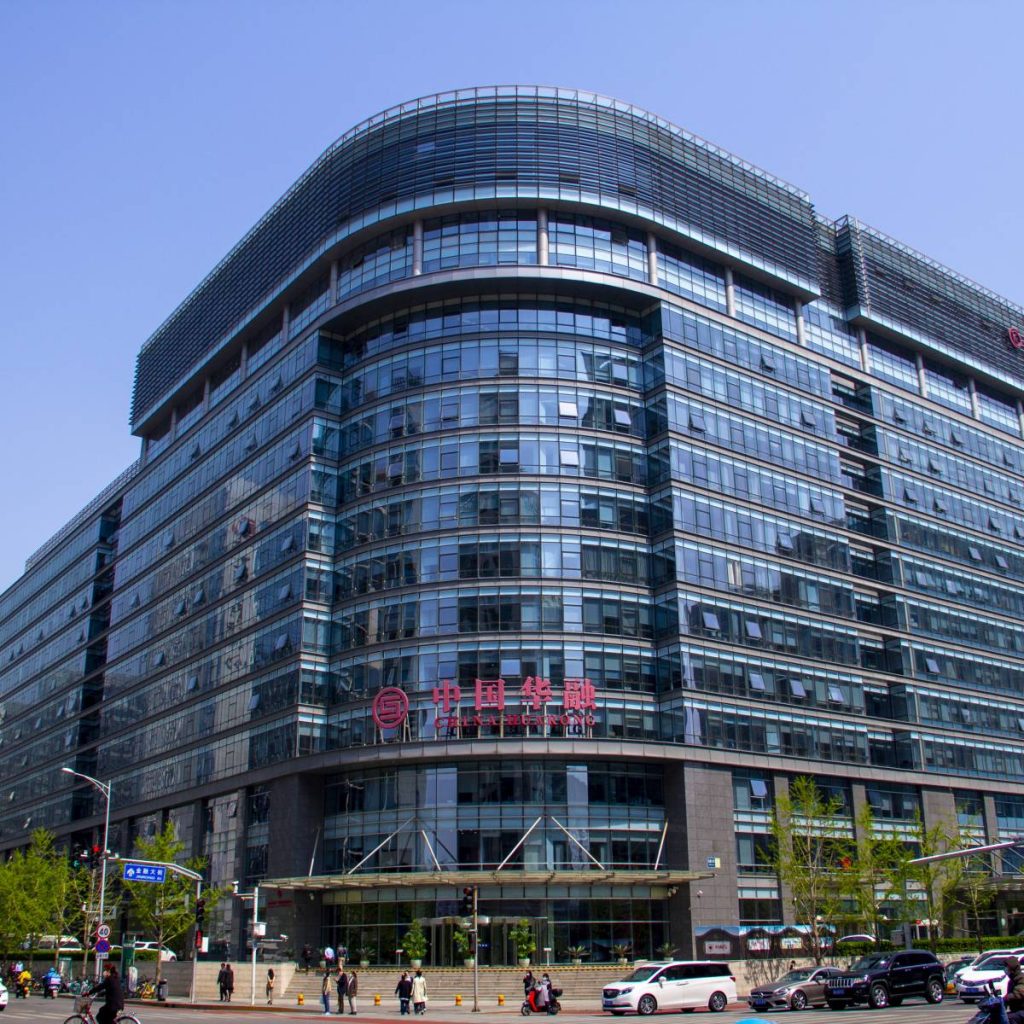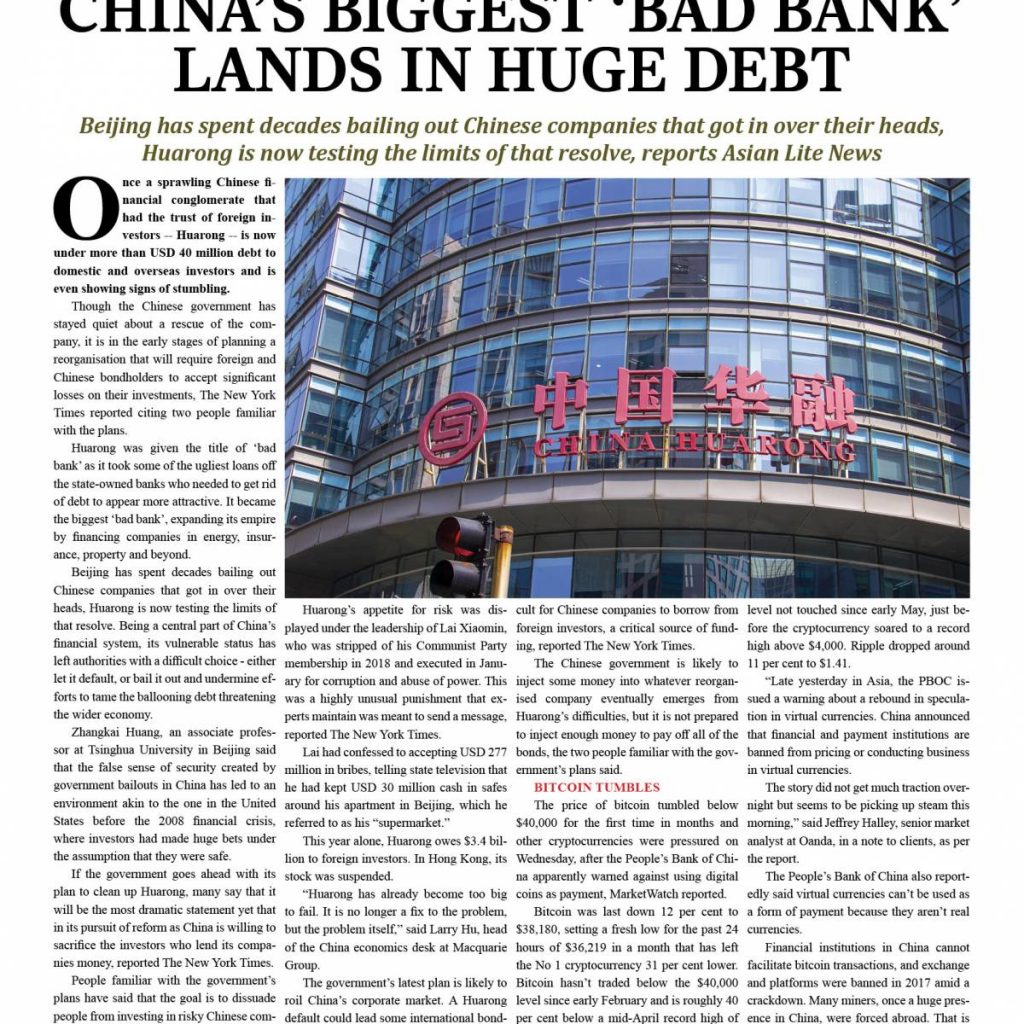
Beijing has spent decades bailing out Chinese companies that got in over their heads, Huarong is now testing the limits of that resolve, reports Asian Lite News
Once a sprawling Chinese financial conglomerate that had the trust of foreign investors — Huarong — is now under more than USD 40 million debt to domestic and overseas investors and is even showing signs of stumbling.
Though the Chinese government has stayed quiet about a rescue of the company, it is in the early stages of planning a reorganisation that will require foreign and Chinese bondholders to accept significant losses on their investments, The New York Times reported citing two people familiar with the plans.
Huarong was given the title of ‘bad bank’ as it took some of the ugliest loans off the state-owned banks who needed to get rid of debt to appear more attractive. It became the biggest ‘bad bank’, expanding its empire by financing companies in energy, insurance, property and beyond.
Beijing has spent decades bailing out Chinese companies that got in over their heads, Huarong is now testing the limits of that resolve. Being a central part of China’s financial system, its vulnerable status has left authorities with a difficult choice – either let it default, or bail it out and undermine efforts to tame the ballooning debt threatening the wider economy.
Zhangkai Huang, an associate professor at Tsinghua University in Beijing said that the false sense of security created by government bailouts in China has led to an environment akin to the one in the United States before the 2008 financial crisis, where investors had made huge bets under the assumption that they were safe.

If the government goes ahead with its plan to clean up Huarong, many say that it will be the most dramatic statement yet that in its pursuit of reform as China is willing to sacrifice the investors who lend its companies money, reported The New York Times.
People familiar with the government’s plans have said that the goal is to dissuade people from investing in risky Chinese companies on the assumption that the government will bail them out.
ALSO READ: US, China engaging in N-arms race
Huarong’s appetite for risk was displayed under the leadership of Lai Xiaomin, who was stripped of his Communist Party membership in 2018 and executed in January for corruption and abuse of power. This was a highly unusual punishment that experts maintain was meant to send a message, reported The New York Times.
Lai had confessed to accepting USD 277 million in bribes, telling state television that he had kept USD 30 million cash in safes around his apartment in Beijing, which he referred to as his “supermarket.”
This year alone, Huarong owes $3.4 billion to foreign investors. In Hong Kong, its stock was suspended.

“Huarong has already become too big to fail. It is no longer a fix to the problem, but the problem itself,” said Larry Hu, head of the China economics desk at Macquarie Group.
The government’s latest plan is likely to roil China’s corporate market. A Huarong default could lead some international bondholders to sell their bonds in Chinese state-owned enterprises, and make it more difficult for Chinese companies to borrow from foreign investors, a critical source of funding, reported The New York Times.
The Chinese government is likely to inject some money into whatever reorganised company eventually emerges from Huarong’s difficulties, but it is not prepared to inject enough money to pay off all of the bonds, the two people familiar with the government’s plans said.
Bitcoin tumbles
The price of bitcoin tumbled below $40,000 for the first time in months and other cryptocurrencies were pressured on Wednesday, after the People’s Bank of China apparently warned against using digital coins as payment, MarketWatch reported.
Bitcoin was last down 12 per cent to $38,180, setting a fresh low for the past 24 hours of $36,219 in a month that has left the No 1 cryptocurrency 31 per cent lower. Bitcoin hasn’t traded below the $40,000 level since early February and is roughly 40 per cent below a mid-April record high of $64,829, the report said.

Ether dropped 17 per cent to $2,848, a level not touched since early May, just before the cryptocurrency soared to a record high above $4,000. Ripple dropped around 11 per cent to $1.41.
“Late yesterday in Asia, the PBOC issued a warning about a rebound in speculation in virtual currencies. China announced that financial and payment institutions are banned from pricing or conducting business in virtual currencies. The story did not get much traction overnight but seems to be picking up steam this morning,” said Jeffrey Halley, senior market analyst at Oanda, in a note to clients, as per the report.
The People’s Bank of China also reportedly said virtual currencies can’t be used as a form of payment because they aren’t real currencies. Financial institutions in China cannot facilitate bitcoin transactions, and exchange and platforms were banned in 2017 amid a crackdown. Many miners, once a huge presence in China, were forced abroad. That is as China has been making moves to create its own digital yuan. (ANI/IANS)
ALSO READ: How China exploits social media to amplify its propaganda?


